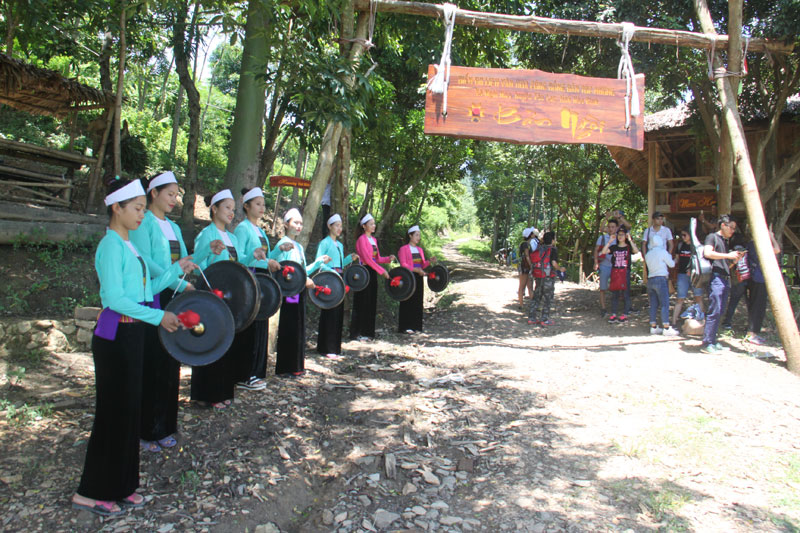
(HBO) – In late July, the Hoa Binh Tourism Investment joint Stock Company organised a two-day tour of new tourism products in Hoa Binh Lake for representatives of travel firms in Hanoi. From Thung Nai port, visitors toured Hoa Binh Lake by boat to admire the beauty of the "Ha Long Bay on land” and then got off in Ngoi village of Ngoi Hoa commune (Tan Lac district) – an ancient village of the Muong ethnic group on the bank of the lake. Without roads, it is completely isolated and so still keeps its pristine beauty and traditional customs of local residents.
Muong girls beat gongs to welcome visitors to the
community-based tourism area of Ngoi village, Ngoi Hoa commune (Tan Lac
district).
Coming to Ngoi village, travelers learnt about
the cultural and culinary identities of Muong people, explored the beauty of
caves there, played 34 water games at Vietnam’s biggest floating water park
recently opened in Ngoi village, and took part in a teambuilding activity –
raft racing on Ngoi Hoa Bay. In the evening, they joined young Muong ethnics in
singing and dancing. At dawn, visitors also followed Ngoi villagers to fish in
the lake, which is an interesting experience of the local daily life.
The second day of the tour was to go trekking
from Ngoi village to Ba Khan commune of Mai Chau district. Along the 6.5km
route that skirts the mountain and traverses fields and streams, tourists
enjoyed the imposing natural landscapes and pure climate of this mountainous
area. Finishing the trip, they went by car from Ba Khan to Hoa Binh city.
The Hoa Binh Tourism Investment joint Stock
Company made a daring decision which is investing 84 billion VND in re-building
Hoa Binh I Hotel with 50 three-star rooms, and equipping two three-star tourist
boats to serve visitors on Hoa Binh Lake – an important highlight in the
province’s tourism industry that aims to provide holiday makers with
high-quality accommodation and waterway transport services.
With a view to changing old tourism services,
not only selling existing products but also selling things that visitors need,
the company has spent five years on developing tourism products and surveying
all places of interest in the province. As a result, more diverse and new
tourism products have been created, satisfying tourists’ specific demand, such
as German and French travelers who prefer cultural exploration while British
and Dutch visitors who love sports, cycling and trekking activities.
In April 2016, the firm implemented the Robinson
eco-tourism site in Sung Island of Tien Phong commune, Da Bac district, with
total investment of about 700 billion VND (30.8 million USD). While seeking new
tourism products, the company realised that Ngoi village gathers sufficient
factors to develop community-based tourism. It decided to develop tourism here
with total spending of 400 billion VND (17.6 million USD). Ngoi village is
considered a step for the company to practice community-based tourism
development in surrounding areas. The business has also equipped locals with
tourism knowledge and skills, thereby helping to improve their livelihoods and
living standards.
A favourable condition is that community-based
tourism in Ngoi village was developed after other areas, so careful steps have
been taken right from the beginning. However, it is difficult to change
residents’ mindset so that they can understand and join efforts in sustainably
developing tourism.
Located just a 20-minute drive from Hoa Binh City, Ora Hill Farmstay & Glamping Hoa Binh is a captivating new destination nestled in Mo hamlet, Bình Thanh commune, Cao Phong district. Combining farming with leisure, this tranquil retreat is perfect for those seeking balance, joy, and an immersive experience in the expansive beauty of nature.
Muong Bi - Tan Lac is renowned as one of the four famous Muong regions in Hoa Binh province. Blessed by nature with a favourable climate and stunning landscapes, Tan Lac holds great advantages for tourism development. The local tourism industry has made remarkable strides in recent times thanks to the attention and support from the local authorities and sectors.
With its strategic location, well-developed transport network, and diverse soil and climatic conditions, Hoa Binh is emerging as a must-visit destination in Vietnam's northwestern tourism corridor. The province boasts numerous attractions, including the Kim Boi hot springs (Kim Boi district), the Dau Rong cave complex (Cao Phong), the Mai Chau valley (Mai Chau), and the iconic Hoa Binh hydropower plant.
The northern mountainous province of Hoa Binh has been listed among the 71 most beautiful places to visit worldwide by the prestigious US travel magazine Condé Nast Traveller.
Hoa Binh province’s rich natural and cultural resources position it as a prime location for developing community-based tourism (CBT). In recent years, support from central and provincial policies, as well as assistance from non-governmental organisations, have encouraged local ethnic minority and mountainous communities to actively engage in the sector.



